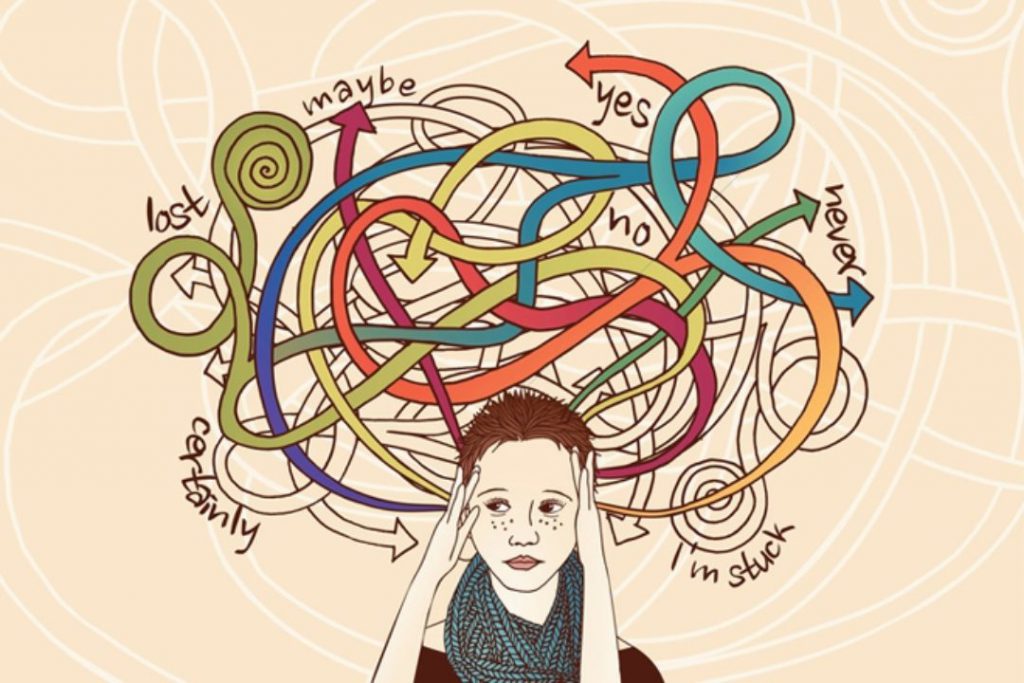Most of us have probably heard friends or family tell us to “stop overthinking things”. Is this good advice? The answer is probably yes, if what you’re doing is ruminating. Daniel fills us in on rumination, how it increases our risk of mental health problems, and what we can do to prevent negative situations taking an excessive toll on our lives.
When negative experiences distress us, it’s probably a good idea not to ignore our feelings. Thinking things over helps us address the underlying issue and be better equipped to deal with similar situations in future. Rumination is a little bit different, and goes beyond ‘overthinking things’. While actively thinking about our problems can help us to come up with solutions, rumination is passive thought that doesn’t involve any problem-solving. In fact, problem-solving is impaired when ruminators fixate on negative thoughts about themselves, past events and what these might mean for their future1 2. It is also different from worrying excessively about a problem. Rumination is most commonly defined as:
“… a mode of responding to distress that involves repetitively and passively focusing on symptoms of distress and on the possible causes and consequences of these symptoms.” 2 [emphasis my own]
So unlike worry, rumination involves a cognitive focus on distressing feelings and events, which can be accompanied by a number of emotions, for example disappointment, frustration, sadness or anger.
Rumination and health
Rumination is a well-known cognitive risk factor for developing mood and anxiety disorders. It predicts higher rates of both depression and anxiety3. It has also been shown to be associated with self-harm4, and to predict suicidal ideation, binge drinking and binge eating5-7. Rumination and worry (together known as ‘repetitive negative thoughts’) have even been found to increase risk for a range of chronic health problems, including cardiovascular disease8.
Rumination can also reduce access to social support. One study found that bereaved ruminators reported seeking more support from friends and family than controls, but experienced more interpersonal problems and received less emotional support9.
Rumination: more than just focusing on the negative
Rumination is associated with having an attentional bias towards negative information, enhanced memory for negative events, and impaired memory for positive events2. This reduces resilience to negative events and fosters a more negative view of the self and the future. Those who frequently ruminate also tend to have difficulty disengaging from negative information10, fuelling the need for maladaptive distraction-based coping behaviours such as binge drinking and self-harm.
Importantly, excessively re-experiencing stressful negative events, and a tendency to imagine more stressful situations in the future, can become a source of chronic stress. This takes a serious biological toll on the brain and body, predisposing to a plethora of health problems including depression, obesity and cardiovascular disease11.
What can be done about rumination?
When rumination is identified in patients with mood or anxiety disorders, their therapeutic treatment plan can include learning to use alternative coping methods, for example just spending time on positive distracting tasks2! Other solutions include cognitive bias retraining (often as part of cognitive-behavioural therapy) and mindfulness, which encourages acceptance of negative emotions to prevent them from triggering ruminative thoughts12.
There’s also a growing body of research on self-compassion (being kind, understanding and accepting towards yourself). Self-compassion is consistently associated with lower rates of mental health problems and better well-being13. Self-compassion could be particularly helpful for ruminators, with one study finding that self-compassion was associated with lower rates of depression and anxiety via its relationship with lower rumination14.
Focusing excessively on the negative aspects of everyday life can turn everyday stressors into persistent issues that can cloud the positive things in life. If you notice yourself or someone you know does a lot of ruminating, it might be good to consider looking into other coping methods, and making sure you’re not low on self-compassion. Some useful resources on this can be found here, here and here.
References
- Lyubomirsky S, Tucker KL, Caldwell ND, et al. Why ruminators are poor problem solvers: Clues from the phenomenology of dysphoric rumination. J Pers Soc Psychol 1999;77(5):1041.
- Nolen-Hoeksema S, Wisco BE, Lyubomirsky S. Rethinking Rumination. Perspect Psychol Sci 2008;3(5):400-24. doi: 10.1111/j.1745-6924.2008.00088.x
- McLaughlin KA, Nolen-Hoeksema S. Rumination as a Transdiagnostic Factor in Depression and Anxiety. Behav Res Ther 2011;49(3):186-93. doi: 10.1016/j.brat.2010.12.006
- Hilt LM, Cha CB, Nolen-Hoeksema S. Nonsuicidal self-injury in young adolescent girls: Moderators of the distress-function relationship. J Consult Clin Psychol 2008;76(1):63.
- Smith JM, Alloy LB, Abramson LY. Cognitive vulnerability to depression, rumination, hopelessness, and suicidal ideation: Multiple pathways to self-injurious thinking. Suicide Life Threat Behav 2006;36(4):443-54.
- Nolen-Hoeksema S, Harrell ZA. Rumination, depression, and alcohol use: Tests of gender differences. J Cogn Psychother 2002;16(4):391.
- Nolen-Hoeksema S, Stice E, Wade E, et al. Reciprocal relations between rumination and bulimic, substance abuse, and depressive symptoms in female adolescents. J Abnorm Psychol 2007;116(1):198.
- Brosschot JF, Gerin W, Thayer JF. The perseverative cognition hypothesis: A review of worry, prolonged stress-related physiological activation, and health. J Psychosom Res 2006;60(2):113-24.
- Nolen-Hoeksema S, Davis CG. “Thanks for sharing that”: Ruminators and their social support networks. J Pers Soc Psychol 1999;77(4):801.
- Whitmer AJ, Gotlib IH. An attentional scope model of rumination. Psychol Bull 2013;139(5):1036.
- Brosschot JF. Markers of chronic stress: Prolonged physiological activation and (un) conscious perseverative cognition. Neurosci Biobehav Rev 2010;35(1):46-50.
- Querstret D, Cropley M. Assessing treatments used to reduce rumination and/or worry: A systematic review. Clin Psychol Rev 2013;33(8):996-1009.
- MacBeth A, Gumley A. Exploring compassion: a meta-analysis of the association between self-compassion and psychopathology, 2012.
- Raes F. Rumination and worry as mediators of the relationship between self-compassion and depression and anxiety. Pers Individ Dif 2010;48(6):757-61.


